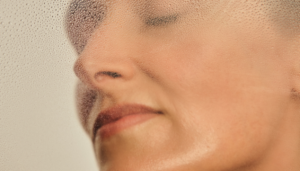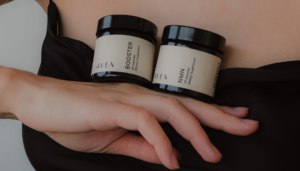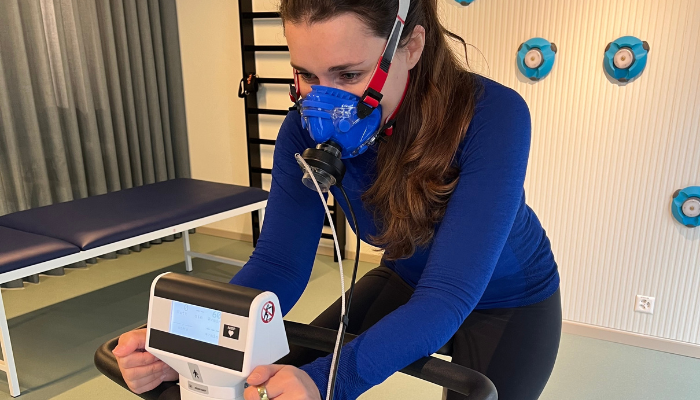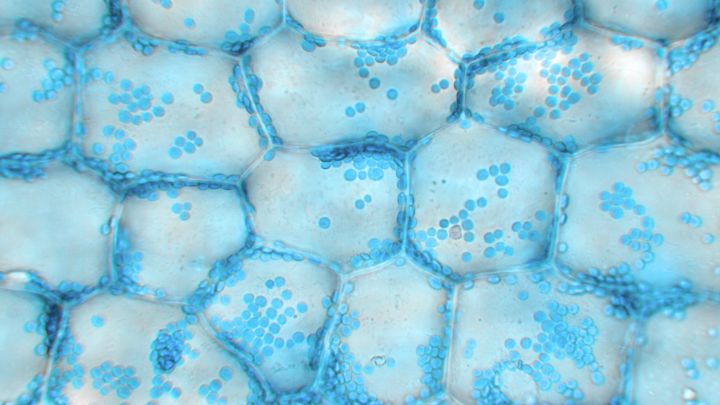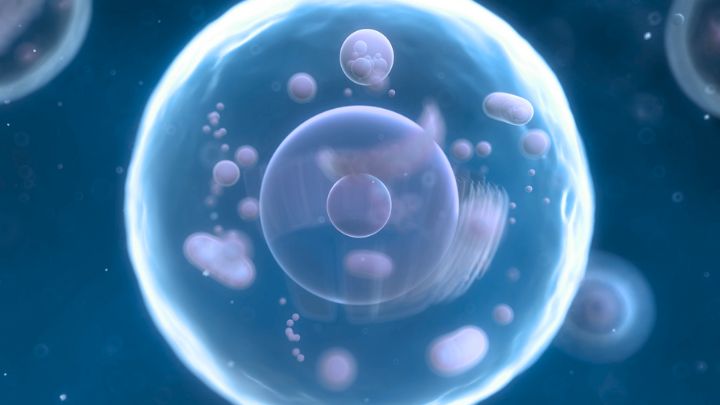Everyone, including the Kardashians, is talking about biological age these days. Khloe, now 40, claims a biological age of 28. Exciting for fans, perhaps, but at Avea, we’re more interested in the science behind this innovative concept.
Unlike your birthdate, biological age considers factors like genetics, lifestyle, and environment, offering a more accurate picture of your body’s ageing process.
As interest in longevity and personalised health grows, biological age tests are becoming crucial tools. People are realising how such tests can help detect potential health risks early, and even guide personalised lifestyle changes to enhance well-being and lifespan.
Want to measure your biological age, but unsure where to start? You’ve come to the right place.
By the end of this Avea article, you can expect to:
- Understand what a biological age test is and why it’s important.
- Learn about different methods for testing biological age.
- Discover how knowing your biological age can guide you towards personalised health improvements.
In this article
FREE longevity guide to optimise health

- Master the science of rejuvenation.
- Apply proven tips to turn back the clock.
- Transform your health with top longevity specialists.
What is a biological age test?
A biological age test evaluates your body’s true age based on various biomarkers, considering factors like genetics, lifestyle, and environment.
These biomarkers can include elements such as telomere length, DNA methylation patterns, metabolic and hormonal levels, and inflammation markers, amongst others.
- Chronological age is a fixed number, marking the passage of time since your birth.
- Biological age is a reflection of your body’s physiological state, which can be influenced by numerous factors, including diet, exercise, sleep, stress levels, and exposure to environmental toxins.
For instance, a 40-year-old person with a healthy lifestyle might have a biological age of 35. This could be due to regular physical activity, a balanced diet rich in antioxidants, adequate sleep, and effective stress management.
On the other hand, another 40-year-old with poor habits—such as smoking, excessive alcohol consumption, a sedentary lifestyle, and poor dietary choices—could have a biological age of 50.
This indicates that their body is ageing faster than their chronological age, due to the detrimental impact of these lifestyle choices. In fact, nobody ages at the same rate.
Learn more about the importance of biological age here.
What is your speed of ageing?
Epigenetics is an incredible field of science with a mature understanding that environmental influences are not just limited to superficial aspects. It reveals how our genes react to life conditions and our habits.
The epigenetic age ratio shows how fast you’re ageing compared to your chronological age.
If your epigenetic age is higher than your chronological age, known as epigenetic “age acceleration,” it means you’re ageing faster and could be at higher risk for health issues and early mortality.
Ideally, your speed of ageing should be less than one, meaning you’re ageing more slowly.
An average speed of ageing would mean that one biological year passes for each chronological year. Keeping your speed of ageing under control can help you stay healthier for longer.
Why is a biological test important?
Age is just a number. So, why bother with a biological test?
Your chronological age may not reveal much, but your biological age holds more valuable insights than you might think.
A biological age test offers a deeper insight into how your body is ageing at the cellular level, beyond just counting the years since your birth.
It shows how your daily choices impact your health, highlighting potential risks early so you can take timely action.
This test also serves as a benchmark to track the effectiveness of lifestyle changes and treatments aimed at improving your health. Who wants to be sick in their golden years anyway?
By knowing your biological age, you can make informed decisions to enhance your well-being and extend your lifespan.
Essentially, a biological age test can help you:
- Personalise your health plan: Tailor your diet, exercise, and lifestyle based on your unique ageing process.
- Motivate healthy changes: Seeing tangible evidence of how your habits affect your biological age can inspire you to adopt healthier behaviours.
- Monitor progress over time: Regular testing can help you see the impact of your health interventions and adjust them as needed.
- Empower preventive care: Early detection of accelerated ageing can prompt preventive measures, helping you reduce the risk of age-related diseases.
Ibrahim reverses bioage by 6.5 years with Avea
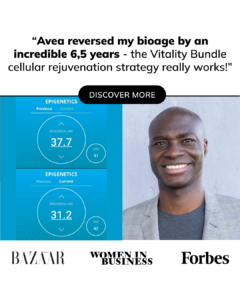
- Uncover how Ibrahim turned back the clock.
- Learn the secrets of cellular health.
- Start your own age-defying routine today.
How can I test my biological age?
There are several scientific methods available to test your biological age, each using specific biomarkers and physiological indicators to provide a precise assessment of your ageing process.
1. Blood tests
Blood tests measure various biomarkers such as cholesterol levels, glucose, and inflammatory markers like C-reactive protein (CRP).
These biomarkers reflect metabolic and physiological functions, offering insights into your overall health and potential age-related decline.
Elevated levels of CRP, for example, indicate inflammation, which is a key driver of ageing and chronic diseases.
2. DNA methylation
This cutting-edge method analyses epigenetic changes in your DNA. DNA methylation involves adding methyl groups to DNA molecules, which can influence gene expression without altering the DNA sequence (a process known as Epigenetic Modifications: A hallmark of ageing).
The pattern of DNA methylation changes with age and is considered a reliable biomarker for biological ageing.
Techniques like the Horvath Clock or the Hannum Clock are renowned for their accuracy in estimating biological age based on DNA methylation patterns. [1].
These methods look at specific sites on the genome where methylation levels correlate strongly with ageing.
3. Telomere length
Telomeres are protective caps at the ends of your chromosomes that shorten with each cell division.
Measuring telomere length can provide an indication of cellular ageing, as shorter telomeres are usually linked with age-related diseases and decreased lifespan.
Telomere shortening is influenced by factors such as oxidative stress, inflammation, and lifestyle choices.
4. Lifestyle assessments
Comprehensive lifestyle assessments evaluate factors such as diet, physical activity, sleep quality, and stress levels.
These assessments often use questionnaires and wearable technology to gather data, which can then be analysed to estimate biological age based on lifestyle factors.
For example, consistent physical activity and a balanced diet are linked to a slower ageing process, whilst chronic stress and poor sleep can accelerate biological ageing.
By integrating data from these assessments, a more holistic view of your biological age can be obtained. However, it’s not as accurate as the other options available to measure your biological age.
Introducing Avea’s Bioage Test
Avea’s Bioage Test is an advanced and reliable option for determining your biological age and understanding how fast you’re ageing.
Discover your biological age
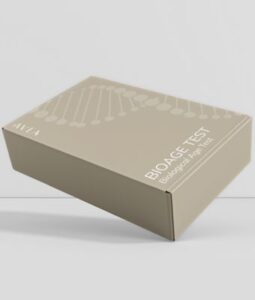
- Measure your speed of ageing.
- Discover the most effective interventions.
- Improve your health with expert insights.
- Track your progress.
Unlike traditional methods, our Bioage Test uses advanced epigenetic analysis to provide a personalised report and actionable insights into your biological age.
1. Step-by-step process
- Sample collection: The test is quick and easy to perform at home. Using a needle mechanism, you collect blood drops on the provided special paper. This method preserves sample stability for accurate analysis.
- Send sample: Place your sample in the prepaid envelope included in your kit, and send it back to our laboratory. Expect your results within 10-12 working days.
- Receive results: Take a survey on our website, and obtain your personalised report that will reveal your biological age and science-backed recommendations to optimise your rate of ageing.
- Expert advice: Book a free 45-minute call with our in-house longevity coach, Nicolas Ting, for personalised guidance on improving your health and slowing down the ageing process (optional).
Benefits of using Avea’s Bioage Test
- Accurate measurement: Measures your epigenetic age ratio to reveal how fast you’re ageing compared to your chronological age. A higher epigenetic age indicates accelerated ageing.
- Maximum convenience: Easy at-home blood test with a painless collection method, including prepaid envelope to send your sample to the laboratory.
- Comprehensive insights: Receive a clear, practical report with prioritised next steps to reverse your biological age.
- Ongoing monitoring: Retest every 6 to 12 months to track your progress and adjust your strategies as needed. Implement positive lifestyle changes, adapt and readjust when needed.
- Expert support: Gain expert advice from a longevity coach to help you implement effective lifestyle changes.
After receiving your test results, you may book a free 45-minute call with our in-house longevity coach, Nicolas Ting.
With extensive experience in nutrition and health, Nicolas simplifies complex science into actionable advice.
Opt for precise guidance on influencing your ageing process and start your journey with confidence, once you’ve taken the Avea Bioage Test.
How can Avea’s Bioage Test help you?
Our report contains more than just your biological age and speed of ageing.
You’ll also get detailed advice on the impact of lifestyle choices on your biological age and longevity.
Here’s a sneak peek:
- Nutrition
- Dietary changes: Explore the advantages of adopting the Mediterranean diet, enhancing vegetable consumption, and moderating coffee and alcohol intake.
- Vegetables: Discover how many veggies you should consume daily to positively influence your ageing process.
- Coffee and alcohol: Uncover the optimal amount of coffee to enjoy and the benefits of reducing sugary beverages.
- Fish and nuts: Learn the ideal amount of fish and nuts to incorporate into your diet to decrease your biological age.
- Lifestyle
- Stress management: Learn different ways for practising mindfulness, improving sleep quality, and mitigating inflammation.
- Mental health: Appreciate the significance of addressing mental health concerns such as PTSD and depression.
- Alcohol and inflammation: Receive guidance on limiting alcohol consumption and preventing chronic inflammation.
- Exercise
- Physical activities: Understand which activities, such as swimming, cycling, and calisthenics, are most conducive to healthy ageing, and how frequently to engage in them. Did you know that regularly playing tennis can improve your bioage by an average of 9 years?
- Supplements
- Beneficial supplements: Obtain advice on the specific vitamins and nutrients, including Vitamin D, Omega-3 fatty acids, and antioxidants, tailored to your specific needs.
The daily vitality boost you need
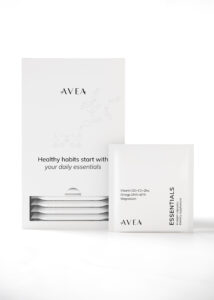
- Address common nutrient deficiencies like Magnesium, Omega-3, and Vitamin D.
- Support immune and overall health.
- Enhance your energy and vitality.
Are biological age tests accurate?
Biological age tests aim to measure your true biological state, but their accuracy may vary.
Here’s a quick rundown:
- Blood tests: Measure biomarkers like cholesterol and glucose. Handy, but short-term health changes can throw off accuracy. Think of it as a snapshot, not the whole movie.
- Telomere length measurement: Checks the length of telomeres, those protective caps on your chromosomes. A decent indicator, but stress and lifestyle factors can mess with the results. Reliable? Sort of, if you live in a bubble.
- DNA Methylation analysis: The gold standard. This method looks at epigenetic changes in your DNA, particularly DNA methylation patterns. Research, including Dr. Steve Horvath’s “epigenetic clock,” shows it’s highly accurate, correlating well with both chronological age and health outcomes.
Whilst no test is perfect, DNA methylation analysis is about as close as you can get currently. It’s a robust tool for understanding your true age and effectively guiding your health and longevity journey.
80% of your ageing process is within your control—use this potential to build a healthier, more vibrant future. Try the Avea Bioage Test and see where you stand, and which direction you should go towards.
References






